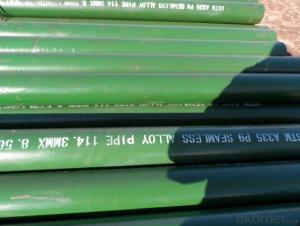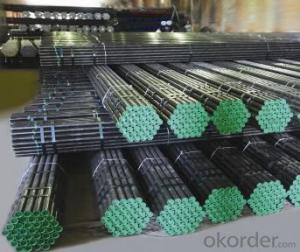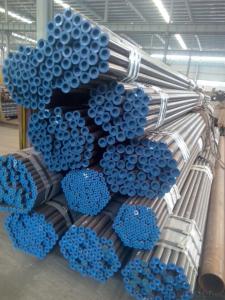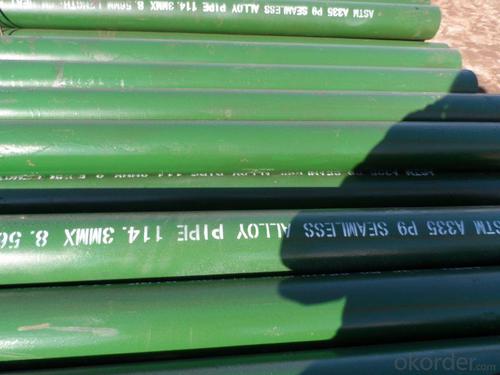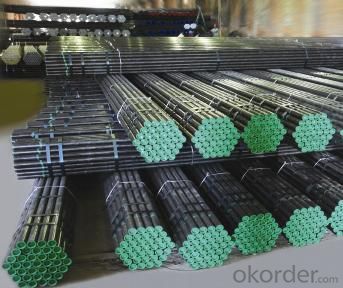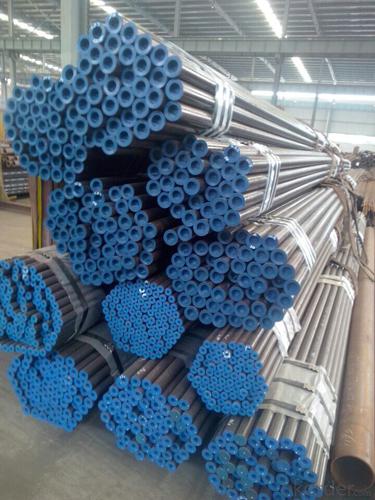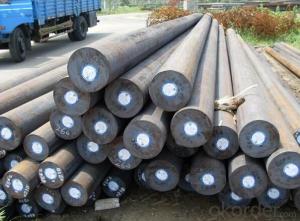Steel pipe A335P9 1-18
- Loading Port:
- China Main Port
- Payment Terms:
- TT OR LC
- Min Order Qty:
- -
- Supply Capability:
- 200T m.t./month
OKorder Service Pledge
OKorder Financial Service
You Might Also Like
A335P9 Steel pipe The standing stock of specifications
A335P9 Steel pipe 70*4.5-5-6-7-8-9-10-12-15-16
A335P9 Steel pipe 245*8-10-14-17-20 -22-30-40
P5 C≤0.15 Mn 0.3-0.6 P ≤0.25 S≤0.25
Si 0.25-1.0 Cr 8-10 Mo 0.9-1.1
Alloy pipe is a steel pipe according to the production materials (i.e. material) to define, just as its name implies is made of alloy steel seamless pipe; and is in accordance with the production process (seamed seamless) to define, seamed pipe seamless pipe is different from, including straight seam welded pipe and spiral tube.
Manufacturing process
1 hot-rolled (extrusion seamless pipe): billet, heating, perforation, three roll cross rolling, rolling or extrusion, tube off, sizing pipe (or reducing), cooling, straightening, water pressure test (or testing), marking, storage
2 cold drawing (rolling) seamless steel pipe: billet, heating, perforation, heading, annealing, pickling, oiling round tube (copper) and multi pass drawing (Leng Zha), the blank pipe, heat treatment, straightening, water pressure test (testing), marking, storage
[(diameter - thickness) * wall thickness of]*0.02466=kg/ meters (per metre weight)
Alloy pipe use
Alloy pipe for low and medium pressure boiler (work pressure is generally not more than 5.88Mpa, the operating temperature at 450 DEG C) of the heating surface tube; used for high pressure boiler (work pressure is generally above 9.8Mpa, operate at a temperature of 450 DEG to 650 DEG C between) the heating surface tubes, economizer, superheater, reheater, petrochemical industry uses the tube and so on.
- Q: What is the role of steel pipes in the construction of bridges and tunnels?
- Steel pipes play a crucial role in the construction of bridges and tunnels. They are extensively used for various purposes due to their strength, durability, and versatility. In bridge construction, steel pipes are commonly employed for the fabrication of the bridge's structural framework. They serve as the primary load-bearing members, providing support and stability to the entire structure. Steel pipes are particularly favored in bridge construction due to their high tensile strength, which enables them to withstand heavy loads, including the weight of vehicles and the dynamic forces generated by traffic. Steel pipes are also utilized in the construction of bridge piers and abutments. These components provide the foundation and support for the bridge structure. Steel pipes are often driven deep into the ground to create sturdy foundations that can withstand the forces exerted by the bridge's weight and external factors such as wind, water currents, and seismic activity. Similarly, steel pipes are essential in tunnel construction. They are extensively used in tunnel lining, which refers to the installation of structural elements along the tunnel walls and roof to provide stability and prevent soil or rock collapse. Steel pipes are often used as reinforcement elements, ensuring the structural integrity of the tunnel and protecting it from external pressures. Moreover, steel pipes are employed for underground utility systems in both bridges and tunnels. They serve as conduits for various utilities such as water supply, electrical cables, gas pipelines, and communication lines. Steel pipes are ideal for these applications due to their corrosion resistance, ability to withstand high pressures, and longevity. Overall, the role of steel pipes in the construction of bridges and tunnels is to provide strength, stability, and durability to the structures. They play a vital role in ensuring the safety and functionality of these critical infrastructure projects, allowing for efficient transportation and the seamless provision of utilities.
- Q: What is the difference between steel pipes and PVC-O pipes?
- Steel pipes and PVC-O pipes differ in their composition, strength, and durability. Steel pipes are made from a combination of iron and carbon, making them extremely strong and resistant to high-pressure applications. However, they are susceptible to corrosion and may require regular maintenance. On the other hand, PVC-O pipes are made from a specialized form of polyvinyl chloride, which enhances their strength and durability while being corrosion-resistant. PVC-O pipes are also lighter, easier to install, and have a longer lifespan compared to steel pipes. Overall, while steel pipes excel in strength, PVC-O pipes offer a more cost-effective and durable solution for various plumbing and industrial applications.
- Q: Can steel pipes be used for roller coaster tracks?
- Yes, steel pipes can be used for roller coaster tracks. In fact, they are one of the most common materials used for roller coaster tracks due to their strength, durability, and versatility. Steel pipes provide excellent support and stability for the roller coaster cars, ensuring a safe and thrilling ride experience for passengers. Additionally, steel pipes can be easily shaped and welded to create various track designs, including loops, twists, and turns, making them ideal for creating exhilarating roller coaster layouts. Furthermore, steel pipes are resistant to corrosion and can withstand harsh weather conditions, making them a reliable choice for outdoor roller coasters. Overall, steel pipes are a popular and reliable choice for roller coaster tracks, offering both safety and excitement for riders.
- Q: What's the difference between a cracked carbon steel tube and a liquid carbon steel tube?
- Test: cracking carbon steel pipe in addition to eddy current testing, but also to do ultrasonic testing, and liquid carbon steel tubes are generally only eddy current testing.
- Q: Can steel pipes be used for gas lines?
- Yes, steel pipes can be used for gas lines. They are commonly used due to their strength, durability, and resistance to high pressure and corrosion. However, it is important to ensure that the steel pipes are specifically designed and certified for use with gas to ensure safety and compliance with industry standards.
- Q: What are the different types of pipe connections used with steel pipes?
- Steel pipes are commonly connected using various types of pipe connections. The most frequently used connections are as follows: 1. Threaded connections: These connections involve screwing the ends of the pipe and using fittings with threads to connect them. They are typically used for smaller pipes and are easy to install and remove. 2. Welded connections: Welding is a popular method for joining steel pipes. This involves melting the metal and fusing the ends of the pipes together. Welded connections are strong and durable, making them suitable for high-pressure applications. 3. Flanged connections: Flanges are used to connect pipes by bolting them together. These connections are commonly used in industrial settings and are preferred for larger pipes or when easy disassembly is required for maintenance. 4. Grooved connections: Grooved fittings with internal grooves are used to connect pipes. These connections are commonly found in fire protection systems and are quick and straightforward to install. 5. Compression connections: Compression fittings are used to connect steel pipes by compressing a ferrule onto the pipe. This type of connection is frequently used in plumbing and provides a secure and tight seal. 6. Mechanical connections: Mechanical connections, such as couplings or clamps, allow for pipe connection without welding or threading. These connections are often used for temporary or emergency repairs. Each type of pipe connection has its own advantages and disadvantages. The choice of connection method depends on factors such as the application, pipe size, and installation requirements. It is crucial to carefully consider these factors to ensure a reliable and secure connection for steel pipes.
- Q: What quota should be installed for heating seamless steel pipe?
- Should be in low carbon steel welding installation set industrial pipeline engineering quota, material to input the name and type of seamless steel pipe specifications and price; according to the description of the contents of related items can be set.
- Q: What are the different types of steel pipe fittings for plumbing systems?
- Some common types of steel pipe fittings used in plumbing systems include elbows, tees, unions, couplings, reducers, and caps. Elbows are used to change the direction of the pipe, while tees allow for branching off into multiple directions. Unions are used to join two pipes together, couplings are used to connect two pipes of the same diameter, and reducers are used to connect pipes of different diameters. Caps are used to seal the end of a pipe.
- Q: Can steel pipes be coated for aesthetic purposes?
- Yes, steel pipes can be coated for aesthetic purposes. Coating steel pipes not only adds a visually appealing finish but also provides protection against corrosion and other environmental factors. There are various coating options available for steel pipes, such as powder coating, epoxy coating, and vinyl coating, among others. These coatings can be applied in different colors and textures to enhance the appearance of the pipes and complement the surrounding environment. Whether in industrial settings, architectural projects, or decorative applications, coating steel pipes can transform them into visually appealing elements while maintaining their structural integrity.
- Q: Are steel pipes suitable for oil and petroleum applications?
- Due to their exceptional strength, durability, and resistance to corrosion, steel pipes find extensive use in oil and petroleum applications. With the ability to endure high pressure and extreme temperatures, these pipes are ideal for the long-distance transportation of oil and petroleum. Moreover, steel pipes possess the added advantage of being able to withstand impact and vibrations, both prevalent in the oil and petroleum industry. Furthermore, their ease of welding and connecting facilitates efficient and cost-effective installation. In summary, steel pipes are the favored option for oil and petroleum applications, guaranteeing the secure and efficient conveyance of these valuable resources.
Send your message to us
Steel pipe A335P9 1-18
- Loading Port:
- China Main Port
- Payment Terms:
- TT OR LC
- Min Order Qty:
- -
- Supply Capability:
- 200T m.t./month
OKorder Service Pledge
OKorder Financial Service
Similar products
Hot products
Hot Searches
Related keywords
